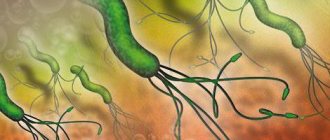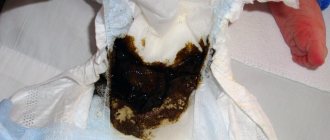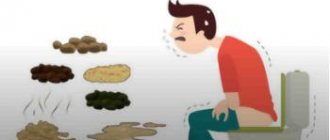Symptoms
If you or people around you smell a persistent smell of acetone from your breath, this may mean that there are disturbances in the functioning of internal organs and systems.
Additional symptoms indicate health problems:
- irritability;
- rapid pulse;
- increased sweating;
- loss of weight, consciousness;
- weakness;
- causeless headaches;
- drowsiness;
- feeling of dry mouth, thirst;
- acrid odor from skin and urine;
- frequent urination.
When the vomiting, pain, heaviness and bloating that accompany the acetone smell are not caused by prolonged fasting, it’s worth thinking about. Most likely, a gastrointestinal tract examination is required.
Smell of acetone from stool in an adult
Feces (feces) is a formed mass consisting of human waste, undigested particles, enzymes, bile components and various bacteria that live on the epithelial lining of the intestine and take part in the formation of immunity.
Normally, feces should have a light brown color, the shape of a dense sausage and a mild characteristic odor. If an adult's stool becomes foul-smelling, in some cases this is due to dietary habits.
Correcting the diet should help solve the problem, but if this does not happen, you need to consult a doctor and rule out pathologies of the digestive and excretory systems.
Foul-smelling stool in an adult
What foods can cause a strong odor?
The pungent, putrid odor of feces can sometimes be associated with dietary patterns and rotting processes that some foods provoke. The “champions” among them are vegetables rich in phytoncides - all varieties of onions and garlic.
If a person consumes them in increased quantities, the feces may acquire a fetid odor associated with the destruction of pathogenic flora, which may be present in small quantities in the intestinal mucous membranes.
An increase in odor can be observed with frequent consumption of cabbage, legumes, and foods with a lot of fat.
Onions and garlic provoke rotting processes in the body
Almost always, a foul odor appears if a person’s diet often contains foods that:
- contain a large number of chemical additives (stabilizers, flavor enhancers, flavorings, preservatives);
- were stored under unsuitable temperature or sanitary conditions;
- contain signs of packaging damage (swollen and dented cans, leaking bags, etc.).
Note! If, simultaneously with the strong smell of feces, the patient develops other symptoms, for example, vomiting, fever or cramping pain in the lower abdomen, the most likely cause is foodborne illness (poisoning).
Signs of food poisoning
The smell of feces has changed: possible reasons
If a person eats right, but the stool has become foul-smelling, the cause may be disturbances in the functioning of the body that arise from internal pathologies or exposure to external factors.
Microflora disturbance
A condition in which the balance of beneficial and opportunistic microorganisms in the intestines is disturbed is called dysbiosis. Opportunistic pathogens are bacteria that are normally present in the human body in small quantities, but are in a latent state and do not cause harm to the body.
When unfavorable conditions are created, opportunistic colonies begin to grow rapidly, which leads to intestinal infections, gastroenteritis and infectious intestinal colitis.
Beneficial bacteria support normal digestion, take part in the formation of systemic and local immunity and increase the body's resistance to pathogens.
The main symptoms of intestinal dysbiosis in an adult
In almost 70% of cases, intestinal dysbiosis develops against the background of antibacterial or antimicrobial therapy, because drugs in this group destroy not only pathogenic but also beneficial bacteria. Pathology can be recognized by the following symptoms:
- changes in the odor and consistency of stool;
- flatulence, a feeling of bloating and distension in the intestines;
- rumbling in the stomach between meals;
- bad breath;
- frequent false urge to defecate.
In some cases, against the background of severe dysbacteriosis, a person may develop a skin rash, acne, and pimples. The smell of feces becomes fetid due to the prevailing pathogenic flora and their waste products.
Additional signs of dysbiosis
To treat dysbiosis, a diet containing a large amount of fermented milk products (they contain lactobacilli necessary for the immune system) and plant fiber (cereals, vegetables, fruits) is prescribed. Drug treatment consists of taking bifid drugs (“ Bifidumbacterin ”, “ Narine ”, “ Normobakt ”, “ Lactofiltrum ”).
Fermented milk bioproduct Narine
Food allergies
Allergies to certain foods can also cause human feces to suddenly develop a strong odor. The most popular food allergens are:
- honey and bee products;
- cow's milk (allergy is caused mainly by milk proteins - lactoglobulins);
- Fish and seafood;
- citruses;
- chocolate and products with added butter or cocoa beans.
Symptoms of food allergies
Food allergies can manifest themselves in different ways. The most typical skin manifestations are itching, rashes, dryness and flaking.
Symptoms from the gastrointestinal tract are also possible: dyspepsia, pain in the abdominal area, diarrhea, flatulence.
In clinically severe forms of food allergy, systemic signs of allergy are added: lacrimation, runny nose, sneezing, laryngospasm.
Changes in stool due to food allergies
Allergy treatment is a long process. The initial stage is a comprehensive diagnosis, which includes immunological tests and tests to identify the allergen.
Symptomatic therapy is carried out using histamine blockers (“ Claritin ”, “ Suprastin ”, “ Tavegil ”, “ Loratadine ”).
Full recovery requires cleansing the intestines of waste and toxins, as well as special therapy, which consists of introducing microdoses of the allergen under the skin. This method allows you to develop stable immunity, as a result of which the body ceases to recognize the allergen as a foreign agent.
Enzyme deficiency
Enzymopathy is a pathology in which the production of digestive enzymes necessary for the absorption and breakdown of certain products is partially or completely stopped. It can be congenital or occur as a result of various disorders in the functioning of internal organs.
One of the forms of fermentopathy in adults is lactase deficiency - a lack of the enzyme responsible for the absorption of milk sugar.
Symptoms of lactase deficiency in patients over 18 years of age may include abdominal pain, foamy or watery stools with a strong, foul odor, and weight loss associated with poor absorption of milk protein.
Enzymopathy in adults
All signs of pathology appear mainly after consuming fermented milk products or products based on whole cow's milk.
It should be noted that true lactase deficiency is rarely diagnosed - such patients are forced to adhere to a special diet throughout their lives that excludes dairy products.
Temporary lactase deficiency is treated with enzyme preparations (“ Lactazar ”, “ Lactase ”).
Foul-smelling stool with fever
If the fecal matter has become liquid, it has a sharp putrid odor, and your overall health has worsened; this may be a sign of an intestinal infection. They can be bacterial (salmonellosis, dysentery) or viral (rotavirus and enterovirus infection).
The symptoms are the same in almost all cases: first, the patient experiences profuse vomiting containing particles of undigested food, after which the temperature rises (up to 39°-40°), foul-smelling diarrhea occurs, and symptoms of dehydration increase.
General signs of intoxication, which include lack of appetite, nausea, drowsiness and weakness, persist with intestinal infections for 3-5 days, after which improvement occurs.
Source: https://shokomania.ru/zapah-acetona-ot-kala-u-vzroslogo/
Causes of odor
A common reason why a strong smell of acetone appears from the mouth is insulin deficiency. The simplest ketone (acetone) and other substances enter the bloodstream and are excreted through the kidneys and respiratory system.
Let's consider what diseases and processes can cause unpleasant odor in adults.
Physiological
Taking medications leads to the appearance of various odors from the mouth.
Factors influencing the occurrence of repulsive amber:
- poor oral hygiene;
- dry mouth (xerostomia);
- smoking;
- eating fatty foods;
- prolonged fasting;
- alcohol;
- medications;
- lack of fluid in the body.
Xerostomia often worries representatives of public speaking professions (TV presenters, teachers).
Pathological
Diseases that cause bad breath:
- pathologies of the salivary glands;
- dysfunction of the thyroid gland;
- dysbacteriosis;
- disorders of the stomach and other gastrointestinal organs;
- dental problems;
- inflammatory processes in the nasopharynx (tonsillitis, runny nose, sore throat, sinusitis);
- pneumonia;
- bronchitis;
- lung abscess;
- tuberculosis;
- liver and kidney diseases;
- anorexia nervosa.
The strong odor of acetone from the mouth is characteristic of men and women with diabetes - in diabetic coma. Its development is due to late detection of the disease.
Video: What does the smell of acetone from a person indicate?
What influences the appearance of a specific odor?
Acetone is a substance that is created from the incomplete breakdown of proteins and fats present in every body. A minimal amount of this component is always present in the bloodstream, but a rapid increase in this component will cause an odor in the mouth, as well as severe disturbances in the functionality of the brain and certain internal organs.

The main reasons for the increased acetone content are:
Diabetes
The smell of acetone coming from a person’s mouth is the first symptom of the development of diabetes, which is manifested by a sharp decrease in insulin in the patient. This phenomenon causes the smell of acetone to remain in the mouth until the end of treatment of the disease.
In diabetes of any type, the nutritional component in adults and infants is glucose, which a person receives through nutrition. In order for glucose to be completely absorbed by the human body, it needs insulin, which is a kind of “key” for opening cells and receiving glucose through them.
Type 1 diabetes mellitus occurs when there is a complete absence of the substance insulin or its sharp decrease. Certain disorders and malfunctions of the pancreas can affect the death of cells that produce insulin. In type 2 diabetes, the substance insulin is produced normally in the body, and as a result, glucose is quickly broken down, but the patient’s cells are unable to absorb it.
To answer the question why the smell of acetone appears from the mouth in this pathology, it is worth knowing that in the absence of insulin, the brain independently sends signals to the body to produce glucose. At the same time, it has to stimulate substrates into the blood, which are ketone bodies, including acetone. When their concentration is high, the sweat of an adult and a teenager smells like acetone. This odor is also observed from the patient’s urine and mouth.
Starvation
An increased level of acetone, which causes a specific odor in the mouth, also appears during fasting or dieting. The mechanism for the appearance of excess concentrations of acetone is similar to the same process that occurs in diabetes. When a patient, on his own or for a certain reason, does not take enough food, the brain begins to automatically send commands, due to which the production of glucose in the body increases significantly.
At first, the body manages to independently maintain glucose levels in normal conditions, but after a day it will have to be content with fats and proteins, the breakdown of which produces ketone bodies that affect the smell of acetone emanating from the patient’s mouth and skin. With regular fasting, the number of these bodies in adults becomes much higher, therefore the smell of acetone, which actively appears from the mouth, is more pronounced.
At the same time, we must not forget that increased acetone during fasting occurs as a result of a strict diet (cottage cheese, fresh fruit or another option) or when treating a specific type of disease with folk recipes. In addition, lack of appetite often causes mental disorders, for example, anorexia nervosa, which is the cause of the smell of acetone that appears during fasting. Tumors of the esophagus and obstructions of this organ also lead to the specific smell of acetone in the mouth during fasting.
Other diseases
The smell of acetone from the mouth is often caused by certain diseases - pathologies of the thyroid gland (by the way, with such a disease, the smell of the breath will resemble the aroma of a cat). Kidney diseases, which prevent the normal removal of “waste” from the body, also cause the appearance of a specific odor from a person, reminiscent of acetone.
Since the liver takes part in metabolic processes, a decrease in its functionality leads to serious disorders, including an increase in the content of acetone in human blood and urine. Why is this happening? The cells of this organ produce many enzymes, i.e. substances responsible for metabolism. If liver cells are damaged due to cirrhosis or another disease, this leads to an imbalance in metabolism, which causes the smell of acetone coming from the mouth.

Treatment of diseases
If diseases of the internal organs lead to bad breath, then first of all they treat them, which will simultaneously eliminate the acetone sign. A purely aesthetic problem caused by physiological factors can be solved at home. Let's talk about this in more detail.
Medicines
First aid to eliminate acetone odor involves reducing the level of ketone bodies in the blood - take Atoxil or Smecta. After these measures, begin treating the underlying disease.
Visit a dentist, endocrinologist and gastroenterologist for a comprehensive examination of the body.
Traditional methods
Effective solutions for rinsing against odor in the mouth:
- Take mint, oak bark, chamomile and sage. Pour boiling water and leave for 30 minutes.
- Mix hydrogen peroxide and water in a 1:1 ratio.
- Rinse your mouth with a small amount of sunflower oil three times a day.
- Dissolve a tablespoon of apple cider vinegar in a glass of water.
- Dilute half a teaspoon of baking soda with a glass of water.
- Pour a glass of boiling water over mint leaves and leave for a day. Drink half a glass a day before meals.
Folk remedies freshen breath partially and for a while. To completely get rid of the acetone stench, use them in combination with your diet.
Diet with acetone

Dietary nutrition is prescribed to restore the body and normalize the level of acetone in the blood.
- Fresh fruits and vegetables are recommended.
- It is allowed to eat plant foods without oil: porridge, vegetable soup, mashed potatoes.
- Avoid fatty foods and sweets with cocoa.
- Eliminate beans and cauliflower from your diet.
- Drink more fluids and healthy sweets (marmalade, marshmallows).
In case of sweet breath, first signs of diabetes, or exacerbation of diabetes, a diet should be prescribed by a doctor.
The smell of acetone in the stool of an adult
> Throat
09.01.2020
Testing for intestinal diseases by smelling stool is increasingly being used around the world. British doctors have developed a whole system for identifying intestinal disorders based on the putrid odor of feces.
And there is nothing strange about this - pathogenic bacteria and microorganisms cause food to rot and release certain harmful toxins that contribute to the formation of an unpleasant odor in stool. A similar testing system was created based on a sensor for recognizing odors characteristic of certain ailments.
The sour smell of feces is an alarming symptom. The reason may be hidden not only in digestive disorders.
The pathology is influenced by chronic intestinal diseases, the development of life-threatening infections - dysbiosis, impaired transportation of food masses, damage to the pancreas.
If the human body cannot adequately ensure the correct process of absorption of vital substances in the intestines, then a chronic illness develops. Poor absorption and very foul-smelling stool may be caused by:
- Food allergies;
- intestinal infections;
- celiac disease;
- food intolerance;
- Crohn's disease;
- inflammation.
Why does stool have an unpleasant, pungent odor? The consistency and smell of stool is influenced by bacteria and microorganisms present in the intestines. With various violations, bacteria are activated and begin to multiply quickly. The growth of pathogenic microflora increases.
As a result, microbes poison the intestines more with their toxins and provoke increased rotting of food. Diarrhea with a sour smell indicates a chronic disorder of the digestive processes and intestinal infection.
Nasty and loose stools in an adult can occur due to pancreatic insufficiency.
Important!
If the diarrhea has an odor, you should consult a doctor. Smelly diarrhea is often accompanied by abdominal pain, vomiting and nausea, flatulence, and fever. All of these conditions can be extremely dangerous. Normally, a healthy person has bowel movements no more than twice a day. Feces have a soft consistency. Evacuation occurs effortlessly and without pain. The color of the stool is brown, and in infants it is light yellow. The smell of feces is normally unpleasant, but without fermentative or putrefactive tones.
What does feces smell like?
What determines the smell of feces? The answer is obvious - from the food taken the day before. Feces without an unpleasant odor are practically never found - certain foods provoke a corresponding “aroma” of feces.
When eating meat, there is a sharp-smelling poop; after eating dairy products or beer, a sour odor may occur. The stench appears when there is illness and the flow of bile into the intestines.
- A sour smell occurs if a person has consumed too much sugar, peas, legumes, or fruits. Foods rich in carbohydrates cause fermentation and dyspepsia.
- The stench develops with impaired pancreatic function and pancreatitis. Also, the stench occurs when there is hypersecretion of the intestines, if diarrhea occurs.
- A putrid smell is a sign of impaired digestion. Appears when proteins are poorly absorbed in the digestive system.
- Oily accents in the smell indicate the influence of bacteria and the decomposition of fats.
In the process of therapy and correction of digestive disorders, it is necessary to adhere to a certain diet. Overeating, drinking alcohol, fatty meats, fried and spicy foods are extremely harmful to the body. In case of obvious violations, you should consult a doctor. For therapy, medications are prescribed to restore digestion.
If an infection is detected, treatment requires the use of an antibiotic. In case of poisoning, drugs that relieve intoxication are used. If no infection is detected, it is enough to follow a diet and take a vitamin complex.
On a note! Diarrhea in adults is treated with medications that harden the stool. Infection is indicated by strongly foul-smelling stools and frequent bowel movements. In some dangerous situations, hospital treatment may be necessary.
Prevention
To avoid various disorders in bowel movements and digestion, it is important to properly handle foods when preparing food.
Meat must be subjected to strong heat treatment. Do not cook meat and vegetables on the same cutting board. Vegetables may be contaminated with salmonella or other pathogenic flora. Bacterial infection of the intestines must not be allowed.
For various pathologies, obesity, and chronic illnesses, it is important to adjust your own diet. The menu should not contain food that causes fermentation in the intestines or irritates the walls of the stomach. These measures will significantly reduce the risk of complications.
It is necessary to observe not only the diet, but also the drinking regimen. Drinking plenty of water should be done daily. You need to drink a lot, using clean table water, and avoid soda. It is allowed to drink teas, fruit drinks, compotes. It is better to avoid freshly squeezed fresh juices.
Daily exercise and walks in the fresh air help improve health. Physical activity stabilizes the functioning of the digestive system and improves peristalsis of organs. The food entering the body is absorbed much faster.
All of the above measures contribute to the fact that the digestive organs will soon begin to work like a clock. The diet prevents the development of constipation and diarrhea, strengthens the immune system and ensures normal feces and bowel movements.
Fetid and putrid odor of feces in an adult. Reasons for changes in stool odor in an infant
An important indicator that helps diagnose intestinal diseases is the smell of stool. It can be affected by pathogenic microorganisms that cause food rotting. Normally, the smell should be unpleasant, but not pungent. If it is sour or rotten, strongly reeks of ammonia, bleach, and bitterness, this indicates disturbances in the digestive tract.
Prevention of bad breath

The well-coordinated functioning of the body largely depends on lifestyle. To avoid bad breath, follow these recommendations:
- monitor the condition of the oral cavity;
- use a soft toothbrush and fluoride-free toothpaste;
- visit the dentist once every six months;
- do not indulge in fatty foods;
- give up bad habits;
- eat fresh vegetables and fruits;
- take medications to support your immune system;
- avoid stressful situations;
- Temper your body and play sports.
Don't ignore a warning sign. The more intense the smell of acetone from an adult’s mouth, the more dangerous the pathological process.
Child's breath smells like acetone
Breath with the smell of acetone in a child under adolescence may be caused by acetone syndrome. The cause of this disease is dysregulation of carbohydrate metabolism and a tendency to rapid depletion of glycogen reserves. The smell of acetone appears either after a long period of hunger (the child had a bad dinner, refused carbohydrate foods), or during acute infectious diseases.
Typical signs of acetone syndrome: odors of obvious chemical origin from the mouth, from urine, severe lethargy, weakness, it is difficult to wake up the child in the morning, abdominal pain and diarrhea are possible. Children who are prone to acetonemic crises are usually thin, easily excitable, and have a well-developed memory. They first smell acetone when they are between 2 and 8 years old. When the child reaches adolescence, this disorder usually disappears.
In a baby, bad breath may be a symptom of lactase deficiency or indicate a lack of nutrition due to a lack of breast milk and frequent regurgitation. If there is a chemical smell coming from diapers and breath, or your child is not gaining weight well, visit your pediatrician immediately. You should not delay going to the doctor, as long-term intoxication is deadly for young children.
Additionally : Metabolic acidosis - what is it and why is it dangerous?









